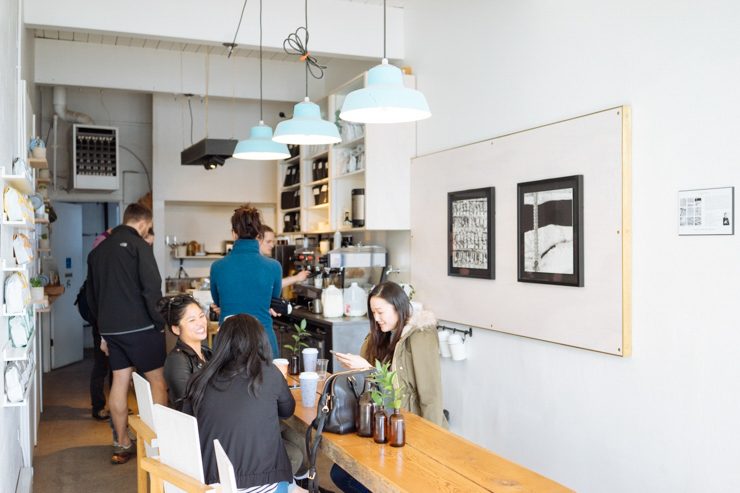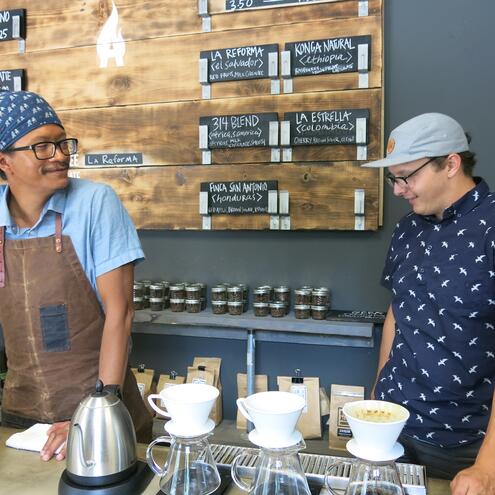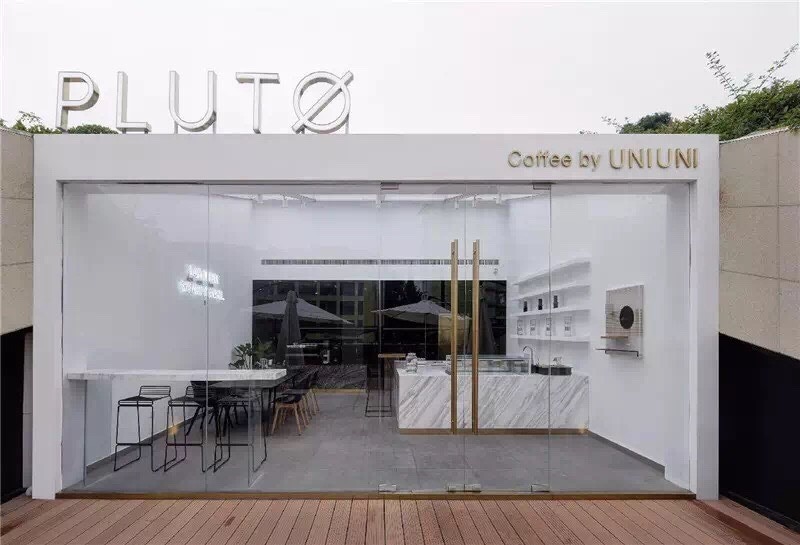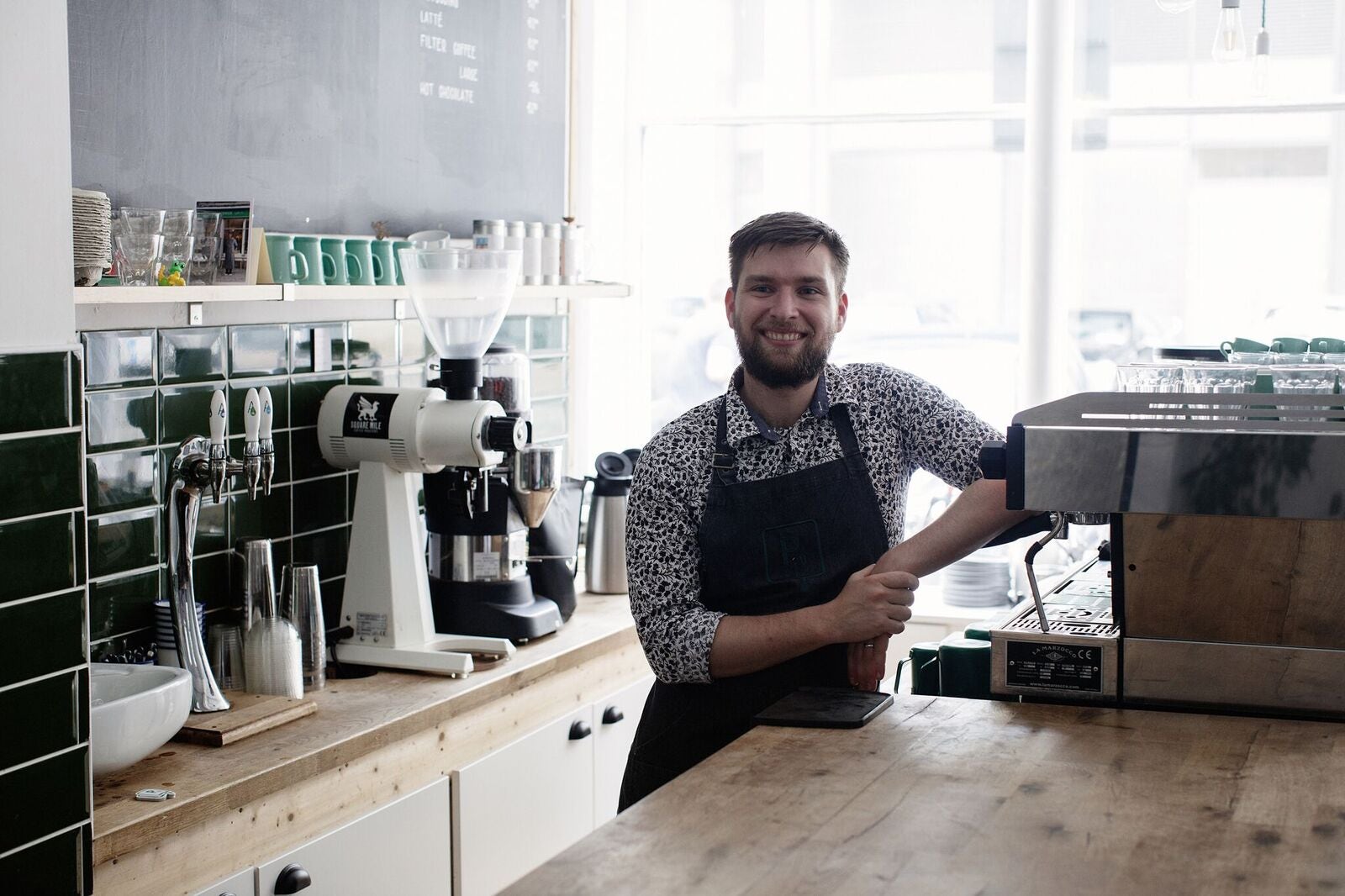
Being "the champ" can serve as an advantage in more ways than one: it can be a boon for business by helping to attract investors as well as increase a café’s visibility to the general public. But owning and operating a café can also influences one’s approach to barista competitions, from selecting coffee to serving panels of judges.
To learn more on the intersection of the café business and coffee competitions, we’ve asked Kyle, Ben, Luis, Niall and Jeremy for their unique perspectives on this subject.
The Café Owners
Black & White Coffee
Wake Forest, North Carolina, United States
Monogram Coffee
Calgary, Canada
Mas Café
Puebla, Mexico
Proper Order Coffee
Dublin, Ireland
Uni Uni
Nanjing, China

Tell us about the path that led you to owning a business.
Luis: While working for a big coffee supply company, I got the idea of having my own business. I was always interested in learning more about coffee, and roasting coffee myself was the absolute best way to learn.
Jeremy: For 12 years I lived in Melbourne and at that time specialty coffee stores were booming. When I moved back to China, my dream became a reality and a new milestone of my career. To have my own coffee shop in a brand new market is challenging and rewarding.
Ben: My interests have always been firmly rooted in the coffee itself, rather than the business side of operating a café. I also knew that if I wanted to continue working in coffee, owning a café was the next step. So, I found two partners that had the strengths and talents that I lacked. I had no idea how much I would enjoy all the aspects of the café industry.
Kyle: At first I resisted the idea, but owning a café is such a great way to interact with the community and to express, with great control, your view on coffee and how it could (and should) be served.
Niall: Fifty percent of all coffee shop owners in Dublin probably worked for Coffee Angel at one time, and I am one of them. Before that, I was a school teacher. My background as a teacher made me quite strong as a coffee educator and I also enjoy implementing systems and procedures in the shop and on the bar. My approach to making changes in a business is rather grassroots and pretty quickly, I realized that if I wanted to continue to work in this style, the only way to do that was to have my own shop.
So not every café is owned by a barista champion…
Kyle: It gives you near instant credibility when people walk in and see the trophies. It helps to have titles from my business partner, and 2016 Urnex Ambassador, Lem Butler, on the wall. He won the 2016 United States Barista Championship and finished fourth place in the 2016 World Barista Championship.
Jeremy: I focused more on the content a being a barista champion rather than the reputation that being barista champion has gained. That’s why there are no trophies in our shops. Instead, we share all our competition knowledge with all our baristas. It was also a great time to reevaluate the way we make coffee at the shop.
Luis: The competitions have helped me become more professional. And the recognition of being champion helps to sell more coffee.
Niall: When I started the job, I was an introvert and shied away from serving customers just because it was so new to me. I think competitions helped me with that – when you’re confident in talking and presenting to people on stage in such a high pressure situation. So chatting to a customer who comes into the shop every day comes a whole lot easier.
Ben: Competing introduces you to so many different baristas, cafes and perspectives in coffee. Seeing all the different approaches has definitely had an impact on our cafés, our coffee and the philosophy of our brand. I have learned so many things from competing and applied to the café, but one of the biggest has been having an outward and forward looking perspective.

What piece of technology or equipment has helped to improve your operation?
Kyle: We have a Loring Coffee Roaster, and it gives us the power and control to express coffees in so many different ways. That thing is amazing.
Ben: We just started roasting at Monogram, at the IKAWA sample roaster has been a huge part of the launch. I use the roaster to roast samples, but I have also used it to roast for competitions. The ability to share profiles through text or email, the ease of use and the repeatability has been a real game-changer. Plus, I can roast in our kitchen!
Jeremy: Funnels for the EG-1 Electric Grinder. If we catch coffee directly into the group head without the funnels, it collects in a mountain shape. No matter how long you groom it, the density distribution is never even. Which forces the water to flow through the edge of the basket. But using coffee funnels can redistribute the density of dose, and enables even extraction. It is a standard method of dosing in our coffee shop.
Luis: I own a roasting business, and having an espresso machine at our facility is very important because this way we can taste the final result that is an espresso.
Niall: We have an awesome espresso machine, the La Marzocco Linea PB, and it has scales built into the drip tray. It does a much better job than I, or any barista I know, could do in making sure things are accurate. But at the end of the day, if it’s not well maintained or cleaned regularly, it won’t matter. You can have all the fancy equipment in the world, but unless it’s clean, your espresso is just going to taste bad.

If you could go back in time, what advice would you give yourself about your plans to open a café?
Jeremy: Be patient and never stop learning.
Ben: Not to stress so much and to empower people earlier. Stress only made me feel more tired and hesitant to do the things I needed to do. People might come to your café once because you won some competition, but they will only keep coming back if the staff that serves them every day is well trained and motivated. You can be the best barista in the world, but if you haven’t built or invested in a team, none of it matters.
Niall: I guess I would have started looking for help a little bit sooner. I knew for a while that I wanted to do a coffee shop, but I stubbornly went it alone. I’ve always been amazed that within the specialty community, people are always so willing to help and support an idea they think is a good one.
Luis: I would have liked to have taken more courses in coffee roasting, but have learned along the way. And everything has gone very well.


